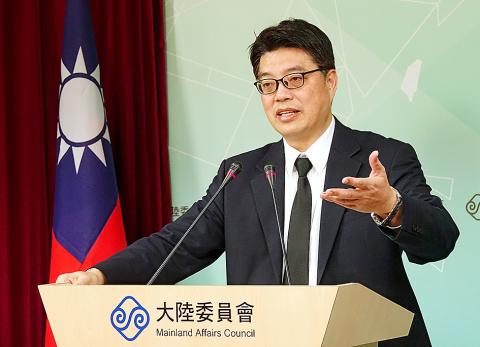The Mainland Affairs Council yesterday said that there would not be any charter flights evacuating Taiwanese from China’s Wuhan either yesterday or today, while it also confirmed that some of the evacuees on the first charter flight from Wuhan on Monday night were not Taiwanese, but Chinese spouses of Taiwanese.
After the Central Epidemic Command Center on Tuesday night announced the 11th confirmed case of 2019 novel coronavirus in Taiwan — a Taiwanese man in his 50s who arrived on the first charter flight and whose fever was detected upon his arrival — local media outlets reported rumors that the man was not included on the passenger list for Monday’s flight.
The reports also cited a source as saying that many of the evacuees were not Taiwanese, but Chinese spouses and family members of Taiwanese, sparking speculation about how the passenger list had been drawn up.

Photo: Liu Hsin-de, Taipei Times
Mainland Affairs Council Minister Chen Ming-tong (陳明通) yesterday said that the council had clearly expressed to Chinese authorities in Wuhan that Taiwanese who were on short trips and lacked resources, as well as children, elderly people and people with chronic diseases that were of higher risk of infection should have been given priority for the charter flight.
“However, the last-minute list of evacuees provided by the Chinese authorities before the plane boarded on Monday was not ideal,” Chen said.
As a passenger’s fever was detected upon his arrival and he was later confirmed to be infected with the 2019 novel coronavirus, disease prevention measures in China would also seem to be flawed, he said.
“Disease prevention measures must be impenetrable before the next charter flight [evacuating Taiwanese] can be arranged,” Chen said.
The council would ensure that disease prevention measures are enhanced, the list of passengers is approved by the council beforehand and that there is enough room in quarantine stations for the evacuees before the next flight is arranged, he said.
Asked to confirm rumors about non-Taiwanese on board the first charter flight, Chen said that all of them were Chinese spouses who held resident certificates for Taiwan.
Separately, asked to confirm a remark by Vincent Hsu (徐正文), who represents a support group for Taiwanese in Wuhan, that a second charter flight would return to Taiwan yesterday, council Deputy Minister Chiu Chui-cheng (邱垂正) said that no charter flights had been scheduled for yesterday or today.
He said that the council would continue to negotiate with Chinese authorities to ensure that passengers on the next flight meet the council’s criteria and the passenger list can be approved by the council at least a day before the flight takes off.
“Some individuals might try to influence the decisionmaking process of who is on board the flights, but only the government has the authority to make those decisions,” Chiu said.
The second charter flight would not be able to take off without the council approving the passenger list, he said.

The US government has signed defense cooperation agreements with Japan and the Philippines to boost the deterrence capabilities of countries in the first island chain, a report by the National Security Bureau (NSB) showed. The main countries on the first island chain include the two nations and Taiwan. The bureau is to present the report at a meeting of the legislature’s Foreign Affairs and National Defense Committee tomorrow. The US military has deployed Typhon missile systems to Japan’s Yamaguchi Prefecture and Zambales province in the Philippines during their joint military exercises. It has also installed NMESIS anti-ship systems in Japan’s Okinawa

‘WIN-WIN’: The Philippines, and central and eastern European countries are important potential drone cooperation partners, Minister of Foreign Affairs Lin Chia-lung said Minister of Foreign Affairs Lin Chia-lung (林佳龍) in an interview published yesterday confirmed that there are joint ventures between Taiwan and Poland in the drone industry. Lin made the remark in an exclusive interview with the Chinese-language Liberty Times (the Taipei Times’ sister paper). The government-backed Taiwan Excellence Drone International Business Opportunities Alliance and the Polish Chamber of Unmanned Systems on Wednesday last week signed a memorandum of understanding in Poland to develop a “non-China” supply chain for drones and work together on key technologies. Asked if Taiwan prioritized Poland among central and eastern European countries in drone collaboration, Lin

Renewed border fighting between Thailand and Cambodia showed no signs of abating yesterday, leaving hundreds of thousands of displaced people in both countries living in strained conditions as more flooded into temporary shelters. Reporters on the Thai side of the border heard sounds of outgoing, indirect fire yesterday. About 400,000 people have been evacuated from affected areas in Thailand and about 700 schools closed while fighting was ongoing in four border provinces, said Thai Rear Admiral Surasant Kongsiri, a spokesman for the military. Cambodia evacuated more than 127,000 villagers and closed hundreds of schools, the Thai Ministry of Defense said. Thailand’s military announced that

CABINET APPROVAL: People seeking assisted reproduction must be assessed to determine whether they would be adequate parents, the planned changes say Proposed amendments to the Assisted Reproduction Act (人工生殖法) advanced yesterday by the Executive Yuan would grant married lesbian couples and single women access to legal assisted reproductive services. The proposed revisions are “based on the fundamental principle of respecting women’s reproductive autonomy,” Cabinet spokesperson Michelle Lee (李慧芝) quoted Vice Premier Cheng Li-chiun (鄭麗君), who presided over a Cabinet meeting earlier yesterday, as saying at the briefing. The draft amendment would be submitted to the legislature for review. The Ministry of Health and Welfare, which proposed the amendments, said that experts on children’s rights, gender equality, law and medicine attended cross-disciplinary meetings, adding that